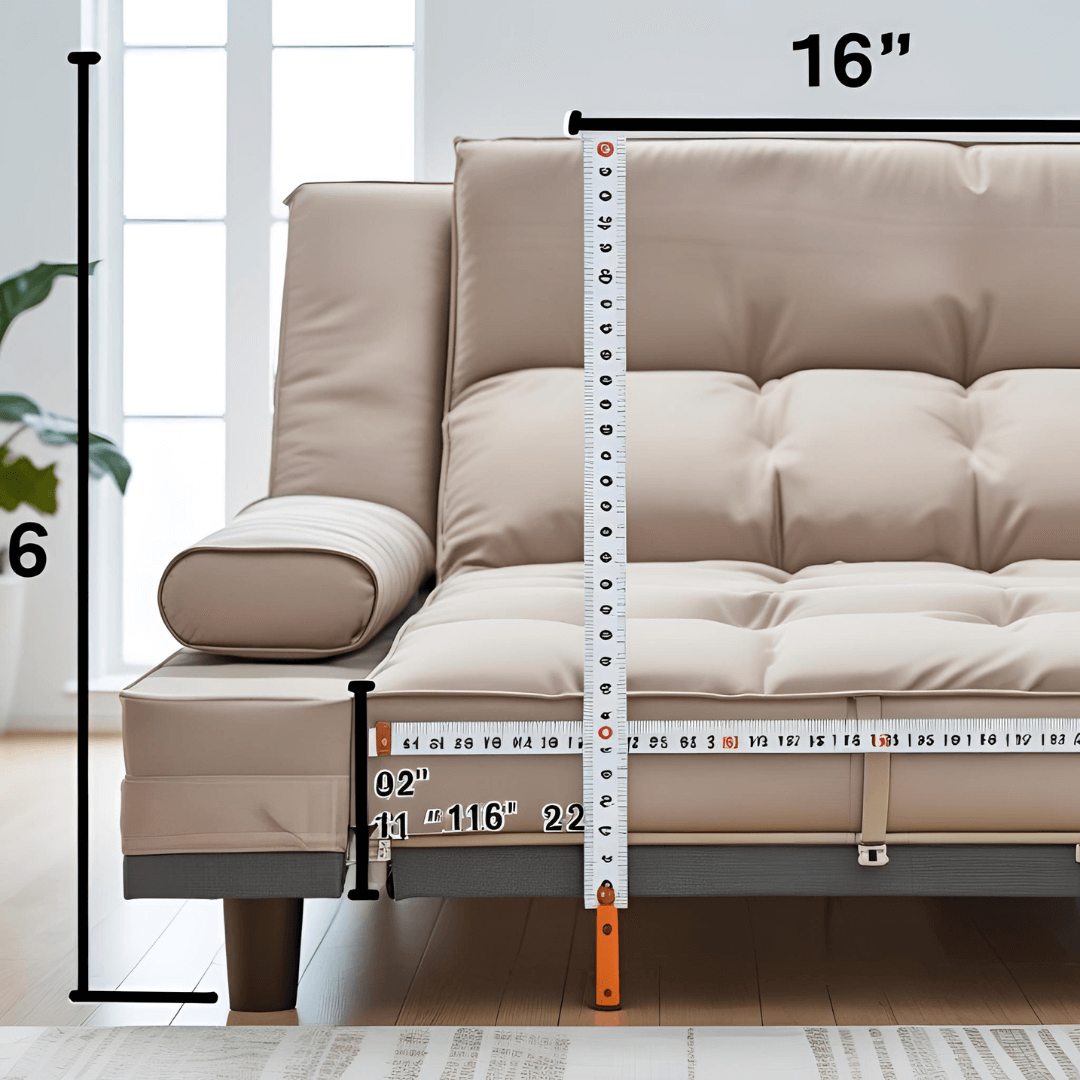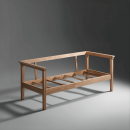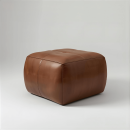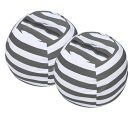
How Wide is a Futon Bed? If you’re shopping for a futon bed, chances are you’ve got one big question on your mind: how wide is it?
Whether you’re planning to fit it into a cozy nook, host overnight guests, or optimize your small living space, knowing the exact dimensions is crucial. After all, you don’t want to bring home a futon only to realize it doesn’t quite fit where you imagined—or worse, it’s not wide enough to be comfortable for sleeping.
But here’s the thing: futon beds come in a variety of sizes, and the width can vary depending on the style, frame, and mattress type. Don’t worry, though—we’ve got you covered. This post will break it all down, so you can confidently choose the perfect futon bed for your space and needs. Ready to uncover the details? Keep reading, and by the end, you’ll feel like a futon expert!
Types Of Futons
Futons are a versatile and popular choice for furniture. They serve as both a bed and a sofa, offering practicality for small spaces. Understanding their size is important to make the right purchase. If you’ve wondered about how wide is a standard futon is or how wide is a full size futon is, this guide will help. Different types of futons have varying widths based on design and functionality. Let’s explore the types of futons to understand their dimensions.
Traditional Futons
Simple design, traditional futons originate from Japan. They are often placed directly on the floor without a frame. These futons are lightweight, portable, and can be folded when not in use.
The width of traditional futons depends on their size category. Below are common dimensions:
| Size | Width (in inches) |
|---|---|
| Single | 39 inches |
| Full | 54 inches |
| Queen | 60 inches |
How wide is a full size futon in traditional design? It’s typically around 54 inches. This makes it a comfortable option for one person or a cozy fit for two. Traditional futons are ideal for minimalist living and smaller rooms. Their compact nature is a key feature for households with limited space.
Modern Futons
Modern futons combine style with practicality. They often feature wooden or metal frames, transforming easily between a sofa and a bed. These futons are popular for living rooms, guest rooms, and small apartments.
The width of modern futons can vary widely based on design:
- How wide is a standard futon? It usually ranges from 75 to 80 inches.
- Full-size futons are typically 54 inches wide, similar to traditional ones.
- Queen-size futons are about 60 inches wide, offering more space.
Modern futons often come with thicker mattresses for added comfort. Frames may also include storage options. These futons are best for those seeking furniture that blends into decor. Their wider frames and stylish designs make them a popular choice.
Choosing The Right Size
Futons are a popular choice for versatile sleeping and seating solutions. Their size and functionality make them ideal for small spaces or multi-purpose rooms. However, understanding the width of a futon bed is crucial when picking the right one. Choosing the correct size ensures it fits your room and provides the comfort you need. Let’s explore the key factors to consider before making your decision.
Room Dimensions
Before purchasing a futon bed, it’s essential to measure your room. The width of a futon bed can vary depending on its size. Common futon sizes include twin, full, and queen. Knowing the exact dimensions of your space helps prevent overcrowding.
Here’s a quick reference table of standard futon bed widths:
| Futon Size | Width (inches) |
|---|---|
| Twin | 39 inches |
| Full | 54 inches |
| Queen | 60 inches |
Consider these tips when measuring your room:
- Leave at least 2 feet of clearance on each side of the futon.
- Account for the space needed when the futon is unfolded.
- Ensure there’s enough room for other furniture and pathways.
By carefully analyzing your room dimensions, you can avoid buying a futon that feels cramped or overwhelming in your space.
Comfort Considerations
Comfort is a major factor when choosing the right futon width. The width of the futon bed directly impacts sleeping and sitting comfort. A wider futon provides more room to stretch out during sleep. On the other hand, a narrower futon might feel restrictive.
Here are a few points to consider:
- Twin futons are ideal for single sleepers or small spaces.
- Full-size futons work well for couples or a guest room.
- Queen futons are perfect for those who value maximum comfort and room.
Also, consider the thickness of the futon mattress. A thicker mattress offers more support and cushions, improving overall comfort.
Lastly, think about how the futon will be used. If it’s for daily use as a bed, prioritize comfort over compactness. For occasional seating, a smaller, more space-efficient futon may suffice. Choosing the right width ensures that your futon meets both your practical and comfort needs.
Measuring A Futon
A futon bed is a versatile and space-saving furniture choice. It serves as both a bed and a sofa, making it popular in homes with limited space. Knowing the dimensions of a futon bed is important for choosing the right one. This blog focuses on understanding the width and thickness of futon beds. Measurements vary, and getting them right ensures comfort and proper fit in your room.
Width Measurement
Futon beds come in various widths to suit different needs. The standard widths are similar to regular mattresses, offering flexibility. Knowing the width is important for ensuring the futon fits your space.
Here are the common futon bed widths:
- Twin Size: About 39 inches wide.
- Full Size: Around 54 inches wide.
- Queen Size: Approximately 60 inches wide.
To measure the width of a futon bed:
- Lay the futon flat in its bed position.
- Use a measuring tape to check the distance from one side to the other.
- Write down the measurement for accuracy.
Choosing the correct width depends on the available space and purpose. A twin futon is ideal for a small room or single sleeper. Full and queen futons are better for couples or larger spaces.
Thickness Measurement
The thickness of a futon mattress affects comfort and durability. Thicker mattresses are more comfortable. Thinner options are lightweight and easier to fold for storage.
Here are typical futon mattress thicknesses:
| Thickness | Comfort Level |
|---|---|
| 4 inches | Basic, suitable for occasional use. |
| 6 inches | Moderate comfort, good for regular use. |
| 8 inches or more | High comfort, ideal for sleeping daily. |
To measure thickness:
- Lay the futon flat on a hard surface.
- Place a ruler or measuring tape vertically on the mattress.
- Note the distance from the bottom to the top surface.
Pick a thickness based on how often the futon will be used. Thicker mattresses are better for everyday sleeping, while thinner ones suit occasional use or small spaces.
Customization Options
Futon beds are versatile and space-saving furniture. They are popular for their functionality and style. One key factor to consider is their width. Understanding how wide a futon mattress can be helps you choose the right fit for your space. Futon beds offer a range of customization options to meet individual needs. From different sizes to mattress types, you can design the perfect futon for your home.
Custom Sizes
Futon beds come in various sizes to match different room layouts. Large futon sizes are ideal for spacious living rooms or guest rooms. Smaller futons suit compact apartments or offices.
Below are the common futon mattress sizes and their approximate dimensions:
| Futon Size | Width | Length |
|---|---|---|
| Twin Size Futon Mattress | 39 inches | 75 inches |
| Full Size Futon Mattress Dimensions | 54 inches | 75 inches |
| Queen Futon Mattress | 60 inches | 80 inches |
Some manufacturers offer custom sizes if standard options don’t meet your needs. You can request specific widths to fit unique spaces. Custom futons are perfect for irregular layouts or specialty furniture setups.
Keep in mind the size of the room and furniture placement. Choosing the right size ensures comfort and functionality without overcrowding your space.
Mattress Types
Futon mattresses come in various types to suit different preferences. Some prioritize comfort, while others focus on durability. Knowing the mattress options helps you pick the perfect one for your futon.
Here are popular futon mattress types:
- Foam Mattress – Lightweight and offers firm support.
- Innerspring Mattress – Includes coils for added bounce and durability.
- Memory Foam Mattress – Molds to your body for personalized comfort.
- Cotton Mattress – Soft and breathable, great for warm climates.
Each type has its advantages depending on your needs. For example, foam mattresses are easy to move and ideal for small futons. Innerspring mattresses last longer for everyday use. Memory foam mattresses provide a luxurious sleeping experience.
Consider how often the futon will be used. Frequent usage may require a durable mattress type, while occasional use might allow for softer options. Always check the compatibility of the mattress with the futon frame.
How Wide Is A Futon Frame
Futon beds are a practical choice for many households. They are popular because they can work as both a bed and a sofa. However, understanding their dimensions is essential before buying one. The width of a futon bed can vary depending on the frame size and type. Below, we will explore futon frame sizes and other important details.
Standard Widths For Futon Frames
Futon frames come in different sizes, just like regular beds. The most common widths include:
- Twin Size: Usually around 39 inches wide.
- Full Size: Typically measures 54 inches wide.
- Queen Size: Generally about 60 inches wide.
These sizes are standard across most brands. Always check the measurements before buying.
How The Frame Design Affects Width
The design of the frame can also impact its total width. Some frames have built-in armrests or side panels. These features can add a few extra inches to the width. For example, a full-size futon frame with armrests up to 58 inches wide.
Compact designs are best for smaller spaces. Wider designs are better for larger rooms.
Comparison Table For Different Frame Sizes
| Futon Frame Size | Typical Width | Best For |
|---|---|---|
| Twin | 39 inches | Single sleepers, small rooms |
| Full | 54 inches | Couples, medium-sized rooms |
| Queen | 60 inches | Couples, large rooms |
Why Width Matters When Choosing A Futon
The width of a futon determines how comfortable it will be. A wider futon provides more space for sleeping and sitting. Narrower options are more suitable for tight spaces.
Consider the size of the room and your specific needs. For example, a twin-size futon is perfect for a small guest room or office. A queen-size futon works better for a family room or master bedroom.
Conclusion
Futon bed widths vary, offering options for different spaces and needs. Compact twin futons fit small rooms, while queen sizes suit larger areas. Knowing the dimensions helps you pick the right fit for comfort. Always measure your space before choosing a futon bed.
This ensures it complements your room and lifestyle. Consider how often it will be used as a bed or sofa. A well-chosen futon can blend style and functionality. Whether for lounging or sleeping, the right size makes all the difference.








